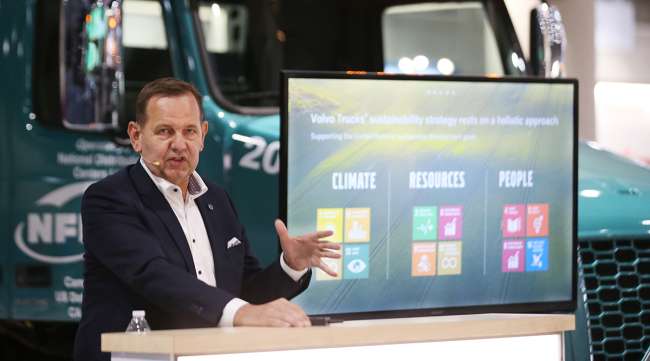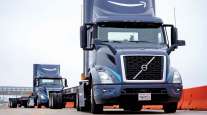Senior Reporter
Volvo Unveils Total Cost of Ownership Tool for Electric Trucks

[Stay on top of transportation news: Get TTNews in your inbox.]
SAN DIEGO — Volvo Trucks North America introduced a tool to help motor carriers examine the financial considerations of adopting zero-emission vehicles.
“We all know that building trucks nowadays is not the easiest thing in the whole world,” VTNA President Peter Voorhoeve told reporters Oct. 23 at American Trucking Associations Management Conference & Exhibition. “Supply chain, inflation, the price — irritations that play together, and we need to have a balance today.”
The company during a press event introduced the Volvo Total Cost of Ownership tool, which is designed to help trucking companies examine various aspects of purchasing zero-emission equipment, such as battery-electric or fuel cell trucks.
“We want to be part of the zero-emission solution,” Voorhoeve said. “Now in our sustainability strategy, we look at climate, we look at resources and we look at people.”
Voorhoeve noted that while battery-electric trucks still carry a significant price premium over diesel trucks, he believes zero-emission trucks can be competitive with diesels under the right circumstances after a few years of operation.
Voorhoeve also outlined the availability of local, state and federal incentive programs and special financing that can further lower cost of ownership. On the maintenance side, he said that with fewer moving parts electric trucks can offer maintenance advantages over diesels.
“We have developed a tool that helps our customers to determine the affordability and economic viability, and the total cost of ownership, of a decarbonized transport solution,” Voorhoeve said. “We’ve taken all these variables and we’ve put them into a model. You can put in all the different variables on energy cost, on maintenance. And then, depending on where you are, the total cost of ownership actually will become competitive somewhere in year four or five when you run the truck.”
Why do we do this? Because we strongly believe that in our business, we can build a better world.
VTNA President Peter Voorhoeve

Voorhoeve later segued into the company’s longstanding goals to reduce CO2 emissions by 50% from 2030 and make the company carbon-free by 2040. He believes those goals are achievable, especially as the company finds ways to extend the range of EVs while also continuing to reduce tailpipe emissions from new diesel trucks.
“Sustainability is not just about selling electric trucks,” Voorhoeve said. “Yes, we are a truck manufacturer, yes we are a transportation solution provider and why do we do this? Because we strongly believe that in our business, we can build a better world.”
Knowledge is power, and that’s where Volvo Trucks’ new Electromobility Total Cost of Ownership (TCO) tool comes in. TCO Tool represents the next step in Volvo’s total transportation solution aimed at accelerating the shift. #ATAmce22 https://t.co/QQpcIyAcQ2 — Volvo Trucks North America (@VolvoTrucksNA) October 24, 2022
Still, Voorhoeve believes the market for electric Class 8 trucks is ripe for expansion, noting that many commercial trucks travel fewer than 200 miles per day — a range current trucks on the market, including the Volvo VNR Electric — can accommodate.
“This is how you need to look at it,” he said. “If all the Class 8 trucks that travel less than 200 miles a day, if they all use this vehicle, then we’ll almost meet our emission targets. That’s how we need to look at it. It’s a combination of combustion engine trucks, battery electric, and fuel cells. Combustion will still be there with renewable energy — not on diesel, but renewable energy.”
Volvo also announced the recent sale of 15 VNR Electric models to Tradelink Transport, a minority-owned trucking company based in Compton, Calif., for its land-bridge operations transporting products for shipping companies between the ports of Los Angeles and Long Beach and nearby rail yards.
“With this order of 15 Volvo VNR Electric trucks, we are excited to become one of the first fleets in the nation to deploy battery-electric trucks and supporting infrastructure into our operations at scale,” Tradelink President Rigoberto Cea said. “Our drivers are excited to drive the new VNR Electric trucks. Most live within a 15-mile radius of our facility and see how vital it is for the trucking industry to reduce its emissions and community impact.” The company said the zero-emission trucks will provide air quality and noise-reduction benefits to the disadvantaged communities located adjacent to the ports, as well as the heavily trafficked I-110 and I-710 Southern California freeway corridors.
Ten of the trucks were purchased with vouchers from California’s Hybrid and Zero-Emission Truck and Bus Voucher Incentive Project.
Want more news? Listen to today's daily briefing below or go here for more info:





